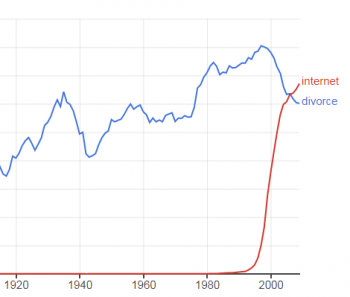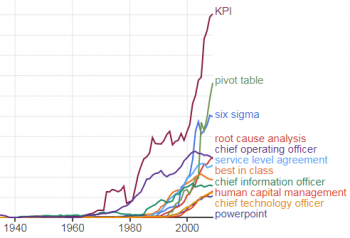Technological unemployment: Difference between revisions
Amwelladmin (talk | contribs) No edit summary |
Amwelladmin (talk | contribs) No edit summary |
||
| Line 15: | Line 15: | ||
Enter the internet, distributed [[network]]s, are tools are sharper but suddenly ''talk is cheap''. As such, you get what you pay for: a lot of cheap talk fills up the workplace. If we haven’t enough of this quadrophonic noise by the time we come to clock out, we can vent the remains of our metaphysical angst into the howling, stone-deaf gale that is the [[world wide web]], rather the well-bent ears of our long-suffering spouses and their bean-stuffed toe-rags. We sit at our tele-screens and watch our rage boil off, evaporating harmlessly into the infinite, thundering dark. | Enter the internet, distributed [[network]]s, are tools are sharper but suddenly ''talk is cheap''. As such, you get what you pay for: a lot of cheap talk fills up the workplace. If we haven’t enough of this quadrophonic noise by the time we come to clock out, we can vent the remains of our metaphysical angst into the howling, stone-deaf gale that is the [[world wide web]], rather the well-bent ears of our long-suffering spouses and their bean-stuffed toe-rags. We sit at our tele-screens and watch our rage boil off, evaporating harmlessly into the infinite, thundering dark. | ||
I’m getting a bit carried away, aren’t I. | [[File:Internet vs divorce.png|350px|frameless|right|A happy compromise, yesterday.]]I’m getting a bit carried away, aren’t I. But not entirely: see left for what Google’s ngram viewer makes of the relationship between marital harmony and a fulfilled online life. But while [https://en.wikipedia.org/wiki/Andy_and_Bill%27s_law Andy (and his successors) have been givething, it is not just Bill who has been takething away]. The [[middle management]] layer has been doing its bit too, by — well, basically by ''inventing'' itself to occupy the space occupied by the crickets. And it we take it that the productivity tools came on line from the mid 1980s — personal computers, the [[fax]], [[e-mail]] and then this glorious thing called the [[world wide web]]. | ||
[[File:BS bingo.png|350px|frameless|right|This graphic courtesy of the JC’s own spurious correlations research programme]]So, wouldn’t it be a gas to see when the middle management [[buzzword]]s started to come into the corpus? | |||
Well, fancy that. | |||
{{sa}} | {{sa}} | ||
*[[Operationalisation]] | *[[Operationalisation]] | ||
{{ref}} | {{ref}} | ||
Revision as of 17:06, 10 March 2020
|
JC pontificates about technology
An occasional series.
|
One of the great dogmas.
As articulated by Keynes: “unemployment due to our discovery of means of economising the use of labour outrunning the pace at which we can find new uses for labour.”[1]. It is fairly obvious that this can only ever be a temporary effect: the possibilities by freeing labour up from one occupation to do anything else must mean in the long run there can be no technological unemployment. but just try telling that to Daniel Susskind.
People who believe the contrary are struck by a lack of imagination: as if there is only one way you could do things, which is how you are doing them now. The whole edifice of technological development is founded on that being utterly wrong: Did Apple, when they invented the iPhone, anticipate all the applications to which it could be put? has the iPhone destroyed, or created, commercial activity?
Indeed technology threatens those who seek to operationalise labour - taking the easy, algorithmic bits, that could - and really, (if reg tech was any good, already should be done by robots.
Operationalisation is the process of trying to render the cosmic mundane - it is to ask to be superseded by robots, as you drive your business model, and your margins, into the ground.
But, yet, yet, yet: one thing we know technology will do is lower the barriers to interaction and communication. And one thing we know that the great huddled masses of mercantile foot-soldiers like to do is talk — as much as possible, and about as little of moment as possible, in as elliptical a way as possible. Visit LinkedIn, or Twitter — hell, just listen to anything that comes out of the middle-management layer of any decent sized firm if you really need persuading of this.
There is an equilibrium of sorts between the need to get stuff done and the need to vent your own opinions, and until that Berners-Lee fellow ruined everything, it was set quite delicately at a place where, for most of us, while achieving anything was hard, finding people to listen to your opinions was even harder, so we spent most of our time in morose silence slugging away at a hard rock-face with an old, soft-bristled, toothbrush. We had collected enough chips of slate to keep our employers happy and take a bit home to keep the hungry mouths around the Formica table passably filled with tinned foods. The only people around to hear our plaintive discursions about the ills of the modern world were those spouses and children, their mouths so crammed with baked beans as to be unable even to reply. The divorce rate was stratospheric.
Enter the internet, distributed networks, are tools are sharper but suddenly talk is cheap. As such, you get what you pay for: a lot of cheap talk fills up the workplace. If we haven’t enough of this quadrophonic noise by the time we come to clock out, we can vent the remains of our metaphysical angst into the howling, stone-deaf gale that is the world wide web, rather the well-bent ears of our long-suffering spouses and their bean-stuffed toe-rags. We sit at our tele-screens and watch our rage boil off, evaporating harmlessly into the infinite, thundering dark.

I’m getting a bit carried away, aren’t I. But not entirely: see left for what Google’s ngram viewer makes of the relationship between marital harmony and a fulfilled online life. But while Andy (and his successors) have been givething, it is not just Bill who has been takething away. The middle management layer has been doing its bit too, by — well, basically by inventing itself to occupy the space occupied by the crickets. And it we take it that the productivity tools came on line from the mid 1980s — personal computers, the fax, e-mail and then this glorious thing called the world wide web.

So, wouldn’t it be a gas to see when the middle management buzzwords started to come into the corpus?
Well, fancy that.
See also
References
- ↑ Keynes: Economic Possibilities for our Grandchildren